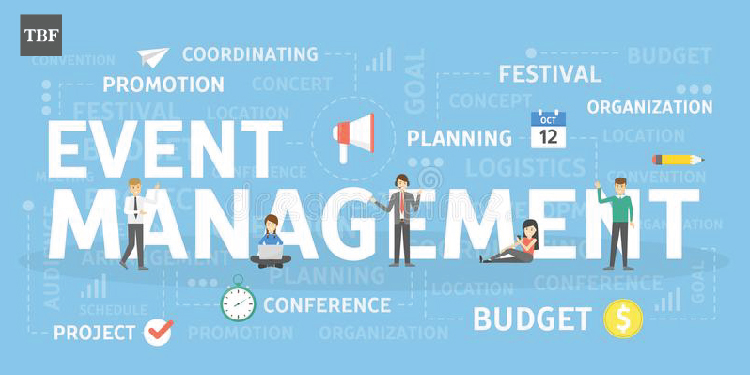Introducing the Uses of Event Management for Seamless Preparation and Implementation
Event management functions as an essential structure for orchestrating effective celebrations. It combines critical planning with careful execution to improve participant experiences and guarantee organizational objectives are met. From coordinating logistics to managing budgets, the complexity of events needs an organized approach. As stakeholders browse these obstacles, understanding the different parts of reliable occasion management becomes essential. What techniques lead to one of the most impactful results?

Comprehending the Relevance of Event Management
Event management plays an important duty in the successful implementation of any gathering, as it assures that all aspects collaborated flawlessly. This self-control includes a large array of jobs, from planning and sychronisation to implementation and analysis. Comprehending its relevance includes acknowledging exactly how effective event management boosts guest experiences while decreasing risks.
A well-managed occasion can cultivate connections, boost involvement, and produce long lasting impacts. It enables companies to share their message clearly and successfully, lining up sources and schedules to meet purposes. In addition, efficient occasion management guarantees budget plan adherence and source optimization, inevitably bring about higher complete satisfaction rates among individuals.
It allows versatility in the face of unpredicted obstacles, permitting coordinators to pivot and maintain the event's integrity. The significance of occasion management lies not just in logistical execution but likewise in its ability to craft meaningful experiences that reverberate with participants long after the event wraps up.
Secret Components of Effective Event Preparation
Efficient event preparation rests on a number of key elements that guarantee a successful end result. Establishing clear purposes is necessary; these goals lead all subsequent decisions and activities. Next off, a distinct spending plan is essential for taking care of sources properly, ensuring that monetary restrictions do not jeopardize the event's quality.
One more crucial element is the option of ideal venues, which need to line up with the occasion's function and accommodate the anticipated target market conveniently. Additionally, setting up a competent team enhances the preparation process, as diverse experience cultivates creativity and problem-solving.
Communication also plays a considerable duty, as preserving open channels among stakeholders ensures everyone is informed and straightened with the occasion's vision. An in-depth timeline aids in collaborating tasks efficiently, allowing for changes as essential. By concentrating on these vital parts, occasion planners can develop unforgettable experiences that achieve their designated goals.
The Role of Modern Technology in Event Management
As innovation continues to progress, its integration into event management has actually changed exactly how organizers organize and perform occasions. Tools such as event management software program streamline procedures, making it possible for seamless registration, ticketing, and attendee monitoring. These systems offer real-time data analytics, enabling coordinators to make educated choices and improve the guest experience.
Online and hybrid occasion technologies have actually increased the reach of events, suiting audiences worldwide with live streaming and interactive attributes. Social media site platforms facilitate advertising initiatives, allowing planners to involve with prospective participants and develop buzz around their events.
Furthermore, mobile applications improve guest involvement by offering timetables, networking opportunities, and instantaneous updates. Making use of RFID and QR codes for accessibility control and tracking likewise boosts safety and security and effectiveness. Generally, innovation offers as an essential element in modern event management, cultivating development and enhancing the total performance of occasion preparation and implementation.
Budgeting and Resource Appropriation Approaches
Budgeting plays a critical function in the success of any kind of occasion, affecting every aspect from location selection to advertising methods. A well-structured spending plan offers as the foundation for reliable resource appropriation, allowing event managers to focus on investing and make notified choices. By categorizing costs-- such as place rental, event catering, entertainment, and innovation-- managers can determine areas for possible cost savings and change allocations accordingly.

Creating an Engaging Participant Experience
Exactly how can event managers craft an appealing guest experience that leaves an enduring impact? They need to concentrate on numerous crucial elements that reverberate with participants. Initially, recognizing the target market's choices and rate of interests permits customized content and tasks. Interactive sessions, such as workshops or Q&A panels, foster participation and link among attendees.
Second, leveraging innovation enhances involvement; live polls, occasion apps, and social networks assimilation urge real-time interaction and comments.
Third, developing an inviting environment is crucial-- thoughtful location format, comfy seating, and attractive style add to a positive experience. charlotte event companies.
Finally, networking possibilities ought to be purposefully prepared, helping with purposeful links amongst guests. By integrating these elements, occasion managers can ensure that participants not just take pleasure in the occasion yet likewise develop enduring memories, enhancing the total influence of the experience.

Threat Management and Contingency Planning
Reliable threat management and contingency planning are necessary parts of successful event management. Recognizing possible dangers early in the planning procedure allows occasion supervisors to carry out strategies that minimize these dangers. Usual dangers include severe weather condition, technical failures, or unexpected adjustments in attendee numbers. By performing detailed risk assessments, managers can prioritize issues based upon their chance and potential influence.
Backup planning involves creating back-up plans to address identified dangers. This consists of protecting alternate venues, developing interaction protocols, and training personnel to handle emergencies. Additionally, having a dilemma management group in position guarantees quick feedbacks to unexpected circumstances, minimizing disruption.
Examining Event Success and Event Feedback
Examining event success includes measuring essential performance signs (KPIs) that line up with the occasion's goals. Post-event surveys give important understandings into attendee experiences and locations for enhancement. charlotte event companies. By analyzing this comments, organizers can enhance future occasions and assurance they meet individuals' expectations
Determining Secret Performance Indicators
While determining key efficiency indications (KPIs) is crucial for recognizing occasion success, it also functions as a foundation for collecting useful feedback. KPIs supply quantifiable metrics that assist occasion managers evaluate different aspects of an occasion, consisting of attendance rates, participant interaction, and general fulfillment. By evaluating these metrics, planners can identify staminas and weaknesses, enabling them to make educated choices for future occasions. Common KPIs consist of ticket sales, social media communications, and post-event sales conversions. Additionally, these indicators can help identify the roi (ROI) of the event, guaranteeing that resources are alloted efficiently. Eventually, an extensive assessment of KPIs boosts tactical preparation and prepares for regular renovation in event management methods.
Post-Event Studies Evaluation
Post-event studies act as a necessary tool for collecting responses and reviewing the general success of an occasion. These studies make it possible for organizers to collect understandings directly from guests, offering click here to find out more beneficial details on numerous aspects, such as material high quality, audio speaker efficiency, and logistical setups. By assessing study reactions, event supervisors can determine staminas and weak points, permitting for notified decisions in future preparation. In addition, patterns in participant satisfaction can be examined, gauging the event's influence on the target audience. This feedback loop i thought about this not only boosts future occasions but also fosters a feeling of area amongst participants, as their opinions add to recurring renovations. Inevitably, post-event studies are critical in driving continual development in occasion management methods.
Regularly Asked Inquiries
What Skills Are Crucial for a Successful Event Manager?
The important skills for an effective event supervisor include strong organizational capabilities, effective interaction, analytic abilities, focus to detail, budgeting knowledge, and adaptability. These competencies make it possible for seamless implementation and management of diverse occasions.
Just How Can Event Management Advantage Small Company?
Event management can improve small companies by improving procedures, improving consumer interaction, and promoting brand name presence. Correctly organized occasions bring in new clients, reinforce area connections, and create unforgettable experiences that drive commitment and repeat organization.
What Are Typical Mistakes to Prevent in Event Preparation?
Typical errors in event planning include poor budgeting, inadequate interaction among employee, neglecting to set clear goals, stopping working to prepare for potential obstacles, and ignoring the importance of post-event assessment for future enhancements.
How Can Sustainability Be Integrated Into Event Management?
Integrating sustainability into event management involves prioritizing eco-friendly places, minimizing waste, sourcing regional products, and advertising electronic alternatives. These techniques not just lessen ecological impact however also improve the event's attract progressively aware guests.
What Qualifications Are Available for Event Management Professionals?
Various certifications are offered for event management specialists, consisting of the Licensed Meeting Professional (CMP), Certified Unique Events Expert (CSEP), and Event Preparation Certificate. These credentials boost skills, show experience, and increase job market competition in the market.